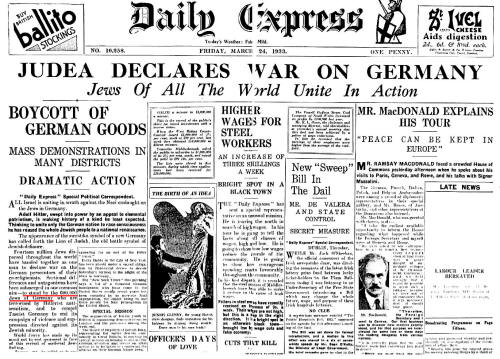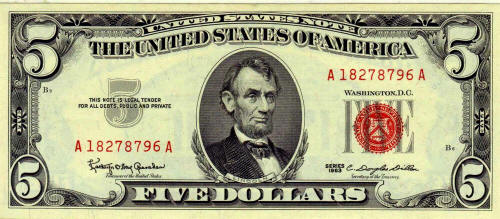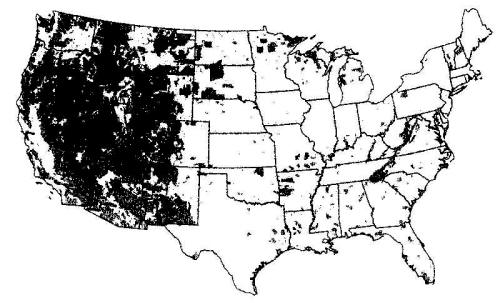Posts tonen met het label corrupt. Alle posts tonen
Posts tonen met het label corrupt. Alle posts tonen
woensdag 12 augustus 2015
woensdag 6 mei 2015
WHY WE ARE ECONOMIC ZOMBIES AND THE TRUE REASON BEHIND THE 40-HOUR WORK WEEK

May 6, 2015 - Economic slavery, or wage slavery, refers to one’s total and immediate dependence on wages to survive. Although people throughout history have had to work to get by, we now live in a culture where we are led to believe we have economic freedom, when unbeknownst to most citizens, we are in fact bound in servitude. We automatically accept a 40-hour workweek with meager hourly pay as normal, even though many work overtime and still struggle to survive. There are also those who make enough to live comfortably but are unable to request less hours—you either work 40 hours a week, or you don’t get to work at all. We submit when told what to wear, when we have to arrive and depart, when we’re allowed to eat, and even when we’re allowed to use the restroom. How is it we have come to allow this?
The 40-hour-work week came about during the Industrial Revolution in Britain when at one point workers were putting in 10 to 16 hour days and began to protest. Working situations for Americans began to worsen as well, and by 1836, labor movement publications were also calling for a 40-hour workweek. Citizens in both situations were so overworked, an eight-hour day was easily accepted. This system is unnecessary now, if it ever was, but we still accept it due to the effects of our capitalist society.
There are many contributing factors that have led to our current economic system and continued acceptance of the 40-hour workweek, three major factors being consumerism, inflation, and debt. First, it’s important to understand exactly what inflation is, how it works, and how it leads to debt.
Inflation:
To put inflation simply, let’s say the U.S. government needs money for whatever war they’ve decided to wage this year. They ask the Federal Reserve for a loan, and the Fed agrees to buy bonds (sort of like IOU’s) from the government in the amount of the requested loan. The U.S. government then prints up a bunch of pieces of paper that say “Treasury Bond” while at the same time, the Federal Reserve prints up a bunch of little pieces of paper that we know as money. A trade is made between the government and the Federal Reserve—the bonds for the money—and the U.S. government directly deposits this newly printed money in a different bank, which in turn, takes its cut in fees and interest. Voilà, money has been created out of thin air.
Although this process takes place electronically now (only 3% of money is in physical form, the other 97% exists in computers) the problem either way is that it depletes the worth of the dollar. At one point in time, currency was worth gold. That was what gave money its value, but now the value of money is trusted to the Federal Reserve who has no moral objections to reducing that value by printing more money (basically legal counterfeit). For the cost of printing, the Federal Reserve creates money that the U.S. government has promised to pay back—money that didn’t even exist in the first place.
It works like this with private bank loans to citizens as well. Each time a transaction of this sort happens, it reduces the value of actual currency, and thus we have inflation. One dollar in 1913 required $21.60 in 2007 to match its value. That’s a 96% devaluation since the Federal Reserve came into existence. How does this lead to economic slavery? By the debt inflation has caused.
Debt:
Since money is created through loans, that means it’s created through debt. Money equals debt, and debt equals money. So the more money there is, the more debt there is, and vice versa. What this means is, if somehow the government and every citizen in debt were able to pay back those loans, there would not be a single dollar in circulation.
Interest plays an important role in this equation as well. When you take out a loan and the bank gives you money that technically doesn’t exist, they also expect you to pay additional interest with it. If the money loaned is coming from the Federal Reserve, where is the money for the interest supposed to come from?
The answer is nowhere.
That means no matter what, the nation will never be able to get out of debt, and that is exactly the purpose of this meticulously orchestrated system. Like a toss of the coin, somebody somewhere will always go bankrupt to make up for the interest that is being paid with even more debt. And so, as the nation sinks further in the hole while the cost of living increases, surviving in the economy becomes more difficult. This desperation to survive, coupled with the fact that we were born into this system, is ultimately what causes us to accept the 40-hour workweek without a moment’s thought.
So now we understand the element that forces us to accept our predicament, but how does the 40-hour workweek benefit banks and corporations? After all, studies show that the average office worker gets less than three hours worth of work done in an 8-hour work shift, and according to reports, US corporate profits are soaring while wages are declining. Bureau of Labor Statistics figures show that productivity has increased at a 2.3 percent annual rate in the third quarter, while hourly pay only increased 1.3 percent in the third quarter, and this has been the basic pattern for some time—it adds up after a while. Corporate profits are at their highest level in at least 85 years, so why aren’t we being paid more, working less, and providing additional jobs to those who need them? This brings us to consumerism.
Consumerism:
Consumerism is defined by the Merriam-Webster dictionary as: the belief that it is good for people to spend a lot of money on goods and services. At one point in time this belief may have rang true, but with the current capitalist system and cost of living, consumerism has begun to have negative effects on our society, especially when you take inflation and the increasing debt into consideration. The more we buy, the more we feed the corporations and banks who are in turn pushing us into economic slavery.
Since the 1800’s and the Industrial Revolution, “consumers” have been spending increasing amounts of money on frivolous purchases. This over-indulgence has been nurtured and fed by the corporations using commercialism (the attitude or actions of people who are influenced too strongly by the desire to earn money or buy goods rather than by other values—Merriam-Webster) as a tool. Psychological insinuations have been planted into society’s subconscious for generations through consumer advertisements which have ultimately led to certain habits and beliefs. Some examples are:
“Buy now pay later” – The General Motors Acceptance Corporation (GMAC) started this mindset when it was established in 1919 and began to promote giving loans to people who bought cars. Americans eventually started to use the new credit plans on just about everything.
“Keeping up with the Joneses” – Commonly thought to be the beginning of the American consumer culture, this mindset began when GM introduced the yearly automobile model change. People wanted to have the latest model each year, and soon this idea spread out. Most of us, whether we want to admit it or not, are familiar with this mentality. Rather than keeping our old toaster that works perfectly fine, we want the new retro-style stainless steel model because it looks swanky sitting on our kitchen counter.
“1929-1945 Depression and War” – Soon after The Depression came WWII, during which advertisers promised products to be available when there was peace. As a result, customers (consumers) were eager to take up spending immediately after the war was over.
“Peace” – When the war ended, consumer optimism and economic growth accompanied victory.
“Charge it!” – Credit cards were first promoted through the Diners Club—a charge card company that services affluent and well-travelled individuals from around the world. Other companies followed suit and started advertising credit cards as a “time-saving device” rather than a way to spend money that wasn’t actually there.
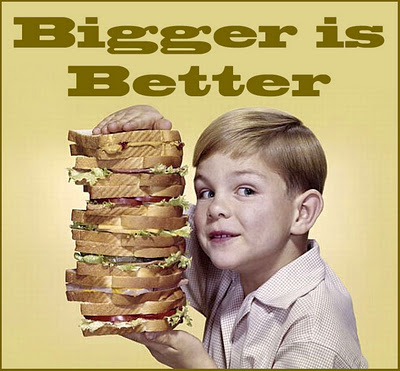 “Bigger is better” – During the 1970’s, companies began to send credit cards out by the masses to those who had not requested them. While Americans had already been developing the idea that “bigger is better”, the credit card boom ended up exploiting that idea. Now people had the means to obtain extravagant items they couldn’t before, even though it put many in colossal debt. Congress soon had to regulate the credit card boom, and ban sending cards to those who never requested them in the first place.
“Bigger is better” – During the 1970’s, companies began to send credit cards out by the masses to those who had not requested them. While Americans had already been developing the idea that “bigger is better”, the credit card boom ended up exploiting that idea. Now people had the means to obtain extravagant items they couldn’t before, even though it put many in colossal debt. Congress soon had to regulate the credit card boom, and ban sending cards to those who never requested them in the first place.Companies in all kinds of industries hold a huge stake in the public’s penchant to be careless with their money, and they encourage this habit of casual or non-essential spending when they can. For example, in the documentary The Corporation, a marketing psychologist discussed a method she used to increase sales that involved encouraging children to nag their parents to buy toys. Studies showed that 20% to 40% of purchases of this sort resulted after children nagged their parents.
“You can manipulate consumers into wanting, and therefore buying, your products. It’s a game.” Lucy Hughes, co-creator of “The Nag Factor”.
The 40-hour workweek is the ultimate tool for corporations to sustain this culture of over-indulgent spending. Under our current working conditions, people are forced to build a life in the evenings and their days-off. We find ourselves more inclined to spend heavily on entertainment and conveniences because we rarely have any free time. When we do have time to ourselves, it’s usually fleeting, and we eventually find ourselves neglecting those activities which are free—walking, exercising, reading, meditating, sports, hobbies, etc.—because they take too much time.
While having extra money comes at the sacrifice of personal time for some, for others they not only are robbed of their personal freedom, but they struggle to make ends meet on top of it. The “perfect” consumer works full-time, earns a fair amount of money, indulges during their free time, and somehow just makes it by each month. However, even those who don’t earn fair wages sometimes find themselves wasting small increments of money on unnecessary items for the wrong reasons—a cup of Starbucks here, a McDonald’s cheeseburger there, and those really cool fuzzy dice hanging from the rear-view of your 1993 Honda Civic.
Any way you look at it, we have become an unhappy, mindless, over-worked society. We buy silly items for a few moments of happiness before getting bored and moving on. We feel a need to keep up with fads, or to fulfill our childhood vision of what adulthood would be like. We hide our insecurities, avoid issues, and replace psychological needs with material items. By keeping society’s free time scarce, people will pay more for convenience, gratification, and any other relief they can buy.
Keeping America unhealthy has become extremely profitable for big-business, and so far their efforts have paid-off beautifully. Our society has been transformed into an industry fueled by economic slavery, and consumerism is a key factor in this corrupt system—one the people have direct influence over. Consumers are the only ones who can stop consuming.
Sources:
Ethos. Dir. Pete McGrain. Cinema Libre Studio, 2011. Documentary
Graph supplied by: (http://economagic.com/)
Jones, Shannon. World Socialist Web Site. Dec 4, 2014. (http://www.wsws.org/en/articles/2014/12/04/wage-d04.html)
Source: http://m.disclose.tv/news/why_we_are_economic_zombies_and_the_true_reason_behind_the_40hour_work_week/117583
Labels:
Banksters,
corrupt,
Corruption,
ECONOMIC,
economische slaven,
financial terror,
REASON,
slaves,
WEEK,
werk,
WORK,
Zombies
donderdag 21 februari 2013
by Michael Rivero14 January 2013
from WhatReallyHappened Website
I know many people have a great deal of difficulty comprehending just how many wars are started for no other purpose than to force private central banks onto nations, so let me share a few examples, so that you understand why the US Government is mired in so many wars against so many foreign nations.
There is ample precedent for this.
The United States fought the American Revolution primarily over King George III's Currency Act, which forced the colonists to conduct their business only using printed bank notes borrowed from the Bank of England at interest.
After the revolution, the new United States adopted a radically different economic system in which the government issued its own value-based money, so that private banks like the Bank of England were not siphoning off the wealth of the people through interest-bearing bank notes.
But bankers are nothing if not dedicated to their schemes to acquire your wealth, and know full well how easy it is to corrupt a nation's leaders. Just one year after Mayer Amschel Rothschild had uttered his infamous,
...the bankers succeeded in setting up a new Private Central Bank called the First Bank of the United States, largely through the efforts of the Rothschild's chief US supporter, Alexander Hamilton.
Founded in 1791, by the end of its twenty year charter the First Bank of the United States had almost ruined the nation's economy, while enriching the bankers. Congress refused to renew the charter and signaled their intention to go back to a state issued value based currency on which the people paid no interest at all to any banker.
This resulted in a threat from Nathan Mayer Rothschild against the US Government,
Congress still refused to renew the charter for the First Bank of the United States, whereupon Nathan Mayer Rothschild railed,
Financed by the Rothschild controlled Bank of England, Britain then launched the war of 1812 to recolonize the United States and force them back into the slavery of the Bank of England, or to plunge the United States into so much debt they would be forced to accept a new private central bank.
And the plan worked. Even though the War of 1812 was won by the United States, Congress was forced to grant a new charter for yet another private bank issuing the public currency as loans at interest, the Second Bank of the United States. Once again, private bankers were in control of the nation's money supply and cared not who made the laws or how many British and American soldiers had to die for it.
Once again the nation was plunged into debt, unemployment, and poverty by the predations of the private central bank, and in 1832 Andrew Jackson successfully campaigned for his second term as President under the slogan, "Jackson And No Bank!"
True to his word, Jackson succeeds in blocking the renewal of the charter for the Second Bank of the United States.
Shortly after President Jackson (the only American President to actually pay off the National Debt) ended the Second Bank of the United States, there was an attempted assassination which failed when both pistols used by the assassin, Richard Lawrence, failed to fire.
Lawrence later said that with Jackson dead, "Money would be more plenty."
Of course, the public school system is as subservient to the bankers' wishes to keep certain history from you, just as the corporate media is subservient to Monsanto's wishes to keep the dangers of GMOs from you, and the global warming cult's wishes to conceal from you that the Earth has actually been cooling for the last 16 years.
Thus is should come as little surprise that much of the real reasons for the events of the Civil War are not well known to the average American.
When the Confederacy seceded from the United States, the bankers once again saw the opportunity for a rich harvest of debt, and offered to fund Lincoln's efforts to bring the south back into the union, but at 30% interest. Lincoln remarked that he would not free the black man by enslaving the white man to the bankers and using his authority as President, issued a new government currency, the greenback.
This was a direct threat to the wealth and power of the central bankers, who quickly responded.
In 1872 New York bankers sent a letter to every bank in the United States, urging them to fund newspapers that opposed government-issued money (Lincoln's greenbacks).
Goaded by the private bankers, much of Europe supported the Confederacy against the Union, with the expectation that victory over Lincoln would mean the end of the Greenback.
France and Britain considered an outright attack on the United States to aid the confederacy, but were held at bay by Russia, which had just ended the serfdom system and had a state central bank similar to the system the United States had been founded on. Left free of European intervention, the Union won the war, and Lincoln announced his intention to go on issuing greenbacks.
Following Lincoln's assassination, the Greenbacks were pulled from circulation and the American people forced to go back to an economy based on bank notes borrowed at interest from the private bankers.
Finally, in 1913, the Private Central Bankers of Europe, in particular the Rothschilds of Great Britain and the Warburgs of Germany, met with their American financial collaborators on Jekyll Island, Georgia to form a new banking cartel with the express purpose of forming the Third Bank of the United States, with the aim of placing complete control of the United States money supply once again under the control of private bankers.
Owing to hostility over the previous banks, the name was changed to "The Federal Reserve" system in order to grant the new bank a quasi-governmental image, but in fact it is a privately owned bank, no more "Federal" than Federal Express.
Indeed, in 2012, the Federal Reserve successfully rebuffed a Freedom of Information Lawsuit by Bloomberg News on the grounds that as a private banking corporation and not actually a part of the government, the Freedom of Information Act did not apply to the operations of the Federal Reserve.
1913 proved to be a transformative year for the nation's economy, first with the passage of the 16th "income tax" Amendment and the false claim that it had been ratified.
Later that same year, and apparently unwilling to risk another questionable amendment, Congress passed the Federal Reserve Act over Christmas holiday 1913, while members of Congress opposed to the measure were at home.
This was a very underhanded deal, as the Constitution explicitly vests Congress with the authority to issue the public currency, does not authorize its delegation, and thus should have required a new Amendment to transfer that authority to a private bank. But pass it Congress did, and President Woodrow Wilson signed it as he promised the bankers he would in exchange for generous campaign contributions.
Wilson later regretted that decision.
The next year, World War One started, and it is important to remember that prior to the creation of the Federal Reserve, there was no such thing as a world war.
World War One started between Austria-Hungary and Serbia, but quickly shifted to focus on Germany, whose industrial capacity was seen as an economic threat to Great Britain, who saw the decline of the British Pound as a result of too much emphasis on financial activity to the neglect of agriculture, industrial development, and infrastructure (not unlike the present day United States).
Although pre-war Germany had a private central bank, it was heavily restricted and inflation kept to reasonable levels. Under government control, investment was guaranteed to internal economic development, and Germany was seen as a major power. So, in the media of the day, Germany was portrayed as the prime opponent of World War One, and not just defeated, but its industrial base flattened.
Following the Treaty of Versailles, Germany was ordered to pay the war costs of all the participating nations, even though Germany had not actually started the war.
This amounted to three times the value of all of Germany itself. Germany's private central bank, to whom Germany had gone deeply into debt to pay the costs of the war, broke free of government control, and massive inflation followed (mostly triggered by currency speculators), permanently trapping the German people in endless debt.
When the Weimar Republic collapsed economically, it opened the door for the National Socialists to take power. Their first financial move was to issue their own state currency which was not borrowed from private central bankers. Freed from having to pay interest on the money in circulation, Germany blossomed and quickly began to rebuild its industry.
The media called it "The German Miracle".
TIME magazine lionized Hitler for the amazing improvement in life for the German people and the explosion of German industry, and even named him TIME Magazine's Man Of The Year in 1938.
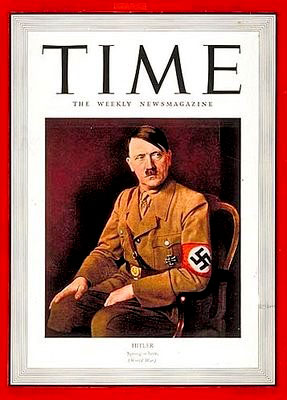
Once again, Germany's industrial output became a threat to Great Britain.
Germany's state-issued value based currency was also a direct threat to the wealth and power of the private central banks, and as early as 1933 they started to organize a global boycott against Germany to strangle this upstart ruler who thought he could break free of private central bankers!
As had been the case in World War One, Great Britain and other nations threatened by Germany's economic power looked for an excuse to go to war, and as public anger in Germany grew over the boycott, Hitler foolishly gave them that excuse.
Years later, in a spirit of candor, the real reasons for that war were made clear.
As a side note, we need to step back before WW2 and recall Marine Major General Smedley Butler.
In 1933, Wall Street bankers and financiers had bankrolled the successful coups by both Hitler and Mussolini. Brown Brothers Harriman in New York was financing Hitler right up to the day war was declared with Germany.
And they decided that a fascist dictatorship in the United States based on the one on Italy would be far better for their business interests than Roosevelt's "New Deal" which threatened massive wealth re-distribution to recapitalize the working and middle class of America.
So the Wall Street tycoons recruited General Butler to lead the overthrow of the US Government and install a "Secretary of General Affairs" who would be answerable to Wall Street and not the people, would crush social unrest and shut down all labor unions.
General Butler pretended to go along with the scheme but then exposed the plot to Congress. Congress, then as now in the pocket of the Wall Street bankers, refused to act. When Roosevelt learned of the planned coup he demanded the arrest of the plotters, but the plotters simply reminded Roosevelt that if any one of them were sent to prison, their friends on Wall Street would deliberately collapse the still-fragile economy and blame Roosevelt for it.
Roosevelt was thus unable to act until the start of WW2, at which time he prosecuted many of the plotters under the Trading With The Enemy act.
The Congressional minutes into the coup were finally released in 1967 and became the inspiration for the movie, "Seven Days in May" but with the true financial villains erased from the script.
As President, John F. Kennedy understood the predatory nature of private central banking.
He understood why Andrew Jackson fought so hard to end the Second Bank of the United States. So Kennedy wrote and signed Executive Order 11110 which ordered the US Treasury to issue a new public currency, the United States Note.
Kennedy's United States Notes were not borrowed form the Federal Reserve but created by the US Government and backed by the silver stockpiles held by the US Government.
It represented a return to the system of economics the United States had been founded on, and was perfectly legal for Kennedy to do. All told, some four and one half billion dollars went into public circulation, eroding interest payments to the Federal Reserve and loosening their control over the nation.
Five months later John F. Kennedy was assassinated in Dallas Texas, and the United States Notes pulled from circulation and destroyed (except for samples held by collectors).
John J. McCloy, President of the Chase Manhattan Bank, and President of the World Bank, was named to the Warren Commission, presumably to make certain the banking dimensions behind the assassination were concealed from the public.
As we enter the eleventh year of what future history will most certainly describe as World War Three, we need to examine the financial dimensions behind the wars.
Towards the end of World War Two, when it became obvious that the allies were going to win and dictate the post war environment, the major world economic powers met at Bretton Woods, a luxury resort in New Hampshire in July of 1944, and hammered out the Bretton Woods agreement for international finance.
The British Pound lost its position as the global trade and reserve currency to the US dollar (part of the price demanded by Roosevelt in exchange for the US entry into the war). Absent the economic advantages of being the world's "go-to" currency, Britain was forced to nationalize the Bank of England in 1946.
The Bretton Woods agreement, ratified in 1945, in addition to making the dollar the global reserve and trade currency, obligated the signatory nations to tie their currencies to the dollar.
The nations that ratified Bretton Woods did so on two conditions.
Of course, the Federal Reserve, being a private bank and not answerable to the US Government, did start overprinting paper dollars, and much of the perceived prosperity of the 1950s and 1960s was the result of foreign nations' obligations to accept the paper notes as being worth gold at the rate of $35 an ounce.
Then in 1970, France looked at the huge pile of paper notes sitting in their vaults, for which real French products like wine and cheese had been traded, and notified the United States government that they would exercise their option under Bretton Woods to return the paper notes for gold at the $35 per ounce exchange rate.
Of course, the United States had nowhere near the gold to redeem the paper notes, so on August 15th, 1971, Richard Nixon "temporarily" suspended the gold convertibility of the US Federal Reserve Notes.
This "Nixon shock" effectively ended Bretton Woods and many global currencies started to delink from the US dollar. Worse, since the United States had collateralized their loans with the nation's gold reserves, it quickly became apparent that the US Government did not in fact have enough gold to cover the outstanding debts.
Foreign nations began to get very nervous about their loans to the US and understandably were reluctant to loan any additional money to the United States without some form of collateral.
So Richard Nixon started the environmental movement, with the EPA and its various programs such as "wilderness zones", Roadless areas", Heritage rivers", "Wetlands", all of which took vast areas of public lands and made them off limits to the American people who were technically the owners of those lands.
But Nixon had little concern for the environment and the real purpose of this land grab under the guise of the environment was to pledge those pristine lands and their vast mineral resources as collateral on the national debt.
The plethora of different programs was simply to conceal the true scale of how much American land was being pledged to foreign lenders as collateral on the government's debts; eventually almost 25% of the nation itself.
With open lands for collateral already in short supply, the US Government embarked on a new program to shore up sagging international demand for the dollar.
The United States approached the world's oil producing nations, mostly in the Middle East, and offered them a deal.
The oil rich nations would agree to spend and invest their US paper dollars inside the United States, in particular in US Treasury Bonds, redeemable through future generations of US taxpayers.
The concept was labeled the "petrodollar".
In effect, the US, no longer able to back the dollar with gold, was now backing it with oil. Other peoples' oil. And that necessity to keep control over those oil nations to prop up the dollar has shaped America's foreign policy in the region ever since.
But as America's manufacturing and agriculture has declined, the oil producing nations faced a dilemma. Those piles of US Federal Reserve notes were not able to purchase much from the United States because the United States had little (other than real estate) anyone wanted to buy. Europe's cars and aircraft were superior and less costly, while experiments with GMO food crops led to nations refusing to buy US food exports.
Israel's constant belligerence against its neighbors caused them to wonder if the US could actually keep their end of the petrodollar arrangement.
Oil producing nations started to talk of selling their oil for whatever currency the purchasers chose to use. Iraq, already hostile to the United States following Desert Storm, demanded the right to sell their oil for Euros in 2000 and in 2002, the United Nations agreed to allow it under the "Oil for food" program instituted following Desert Storm.
One year later the United States re-invaded Iraq, lynched Saddam Hussein, and placed Iraq's oil back on the world market only for US dollars.
The clear US policy shift following 9-11, away from being an impartial broker of peace in the Mideast to one of unquestioned support for Israel's aggressions only further eroded confidence in the Petrodollar deal and even more oil producing nations started openly talking of oil trade for other global currencies.
Over in Libya, Muammar Gaddafi had instituted a state-owned central bank and a value based trade currency, the Gold Dinar. Gaddafi announced that Libya's oil was for sale, but only for the Gold Dinar. Other African nations, seeing the rise of the Gold Dinar and the Euro, even as the US dollar continued its inflation-driven decline, flocked to the new Libyan currency for trade. This move had the potential to seriously undermine the global hegemony of the dollar.
French President Nicolas Sarkozy reportedly went so far as to call Libya,
So, the United States invaded Libya, brutally murdered Qaddafi (the object lesson of Saddam's lynching not being enough of a message, apparently), imposed a private central bank, and returned Libya's oil output to dollars only. The gold that was to have been made into the Gold Dinars is, as of last report, unaccounted for.
According to General Wesley Clark, the master plan for the "dollarification" of the world's oil nations included seven targets,
What is notable about the original seven nations originally targeted by the US is that none of them are members of the Bank for International Settlements, the private central bankers private central bank, located in Switzerland. This meant that these nations were deciding for themselves how to run their nations' economies, rather than submit to the international private banks.
Now the bankers' gun sights are on Iran, which dares to have a government central bank and sell their oil for whatever currency they choose. The war agenda is, as always, to force Iran's oil to be sold only for dollars and to force them to accept a privately owned central bank.
The German government recently asked for the return of some of their gold bullion from the Bank of France and the New York Federal Reserve. France has said it will take 5 years to return Germany's gold. The United States has said they will need 8 years to return Germany's gold.
This suggests strongly that the Bank of France and the NY Federal Reserve have used the deposited gold for other purposes, and they are scrambling to find new gold to cover the shortfall and prevent a gold run.
So it is inevitable that suddenly France invades Mali, ostensibly to combat Al Qaeda, with the US joining in. Mali just happens to be one of the world's largest gold producers with gold accounting for 80% of Mali exports.
War for the bankers does not get more obvious than that!
You have been raised by a public school system and media that constantly assures you that the reasons for all these wars and assassinations are many and varied.
The US claims to bring democracy to the conquered lands, butthey haven't; the usual result of a US overthrow is the imposition of a dictatorship, such as,
Assassinations are always passed off as "crazed lone nuts" to obscure the real agenda.
The real agenda is simple. It is enslavement of the people by creation of a false sense of obligation. That obligation is false because the Private Central Banking system, by design, always creates more debt than money with which to pay that debt.
Private Central Banking is not science, it is a religion; a set of arbitrary rules created to benefit the priesthood, meaning the owners of the Private Central Bank. The fraud persists, with often lethal results, because the people are tricked into believing that this is the way life is supposed to be and no alternative exists or should be dreamt of.
The same was true of two earlier systems of enslavement,
...both systems built to trick people into obedience, and both now recognized by modern civilization as illegitimate.
Now we are entering a time in human history where we will recognize that rule by debt, or rule by Private Central Bankers issuing the public currency as a loan at interest, is equally illegitimate.
It only works as long as people allow themselves to believe that this is the way life is supposed to be.
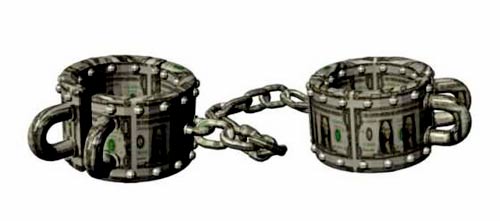
But understand this above all,
Behind all these wars, all these assassinations, the hundred million horrible deaths from all the wars lies a single policy of dictatorship.
The private central bankers allow rulers to rule only on the condition that the people of a nation be enslaved to the private central banks. Failing that, said ruler will be killed, and their nation invaded by those other nations enslaved to private central banks.
The so-called "clash of civilizations" we read about on the corporate media is really a war between banking systems, with the private central bankers forcing themselves onto the rest of the world, no matter how many millions must die for it.
Indeed the constant hatemongering against Muslims lies in a simple fact.
And that is the reason our government and media insist they must be killed or converted.
They refuse to submit to currencies issued at interest. They refuse to be debt slaves.
So off to war your children must go, to spill their blood for the money-junkies' gold. We barely survived the last two world wars. In the nuclear/bioweapon age, are the private central bankers willing to risk incinerating the whole planet just to feed their greed?
Apparently so.
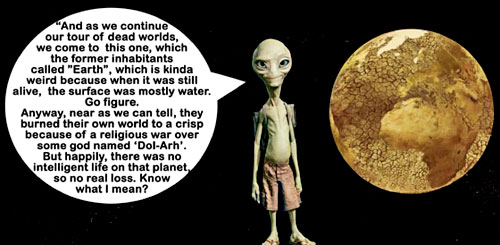
Flag waving and propaganda aside, all modern wars are wars by and for the private bankers, fought and bled for by third parties unaware of the true reason they are expected to gracefully be killed and crippled for.
The process is quite simple.
As long as Private Central Banks are allowed to exist, inevitably as the night follows day there will be poverty, hopelessness, and millions of deaths in endless World Wars, until the Earth itself is sacrificed in flames to Mammon.
The path to true peace on Earth lies in the abolishment of all private central banking everywhere, and a return to the state-issued value-based currencies that allow nations and people to become prosperous.
The very essence of the banking system.
To make us all slaves to debt.
Those who control the debt, control everything.
|
Labels:
bankers,
corrupt,
financial tiranny,
GMO,
Hitler,
Monsato,
Rothschild,
the Federal Reserve,
wars,
World War
Abonneren op:
Posts (Atom)


